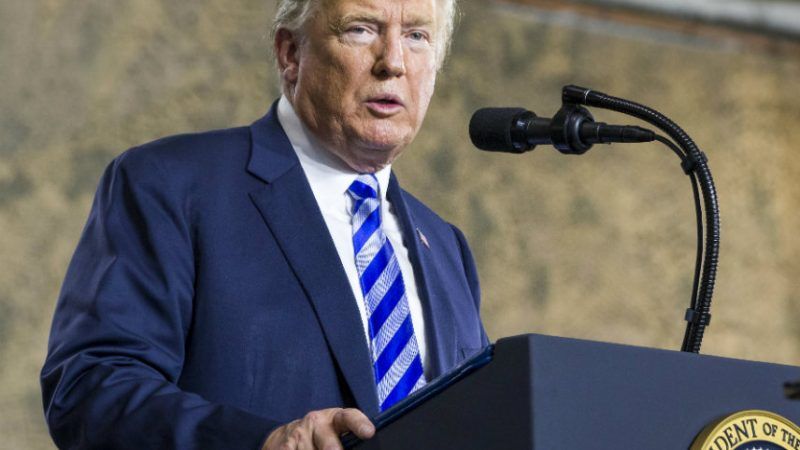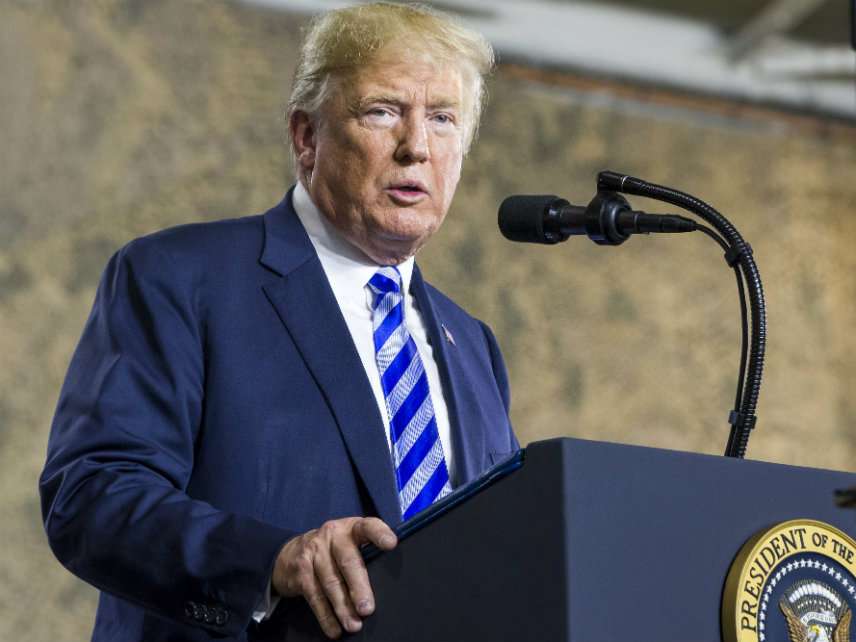Trump Might Be a Criminal. But So Is Everyone Else.
A question that now hangs like a miasma over D.C. is "Which of my staffers would hang me out to dry in order to avoid going to federal prison?"


Donald Trump has been credibly accused by his own lawyer of participating in a conspiracy to violate campaign finance laws. And he is going to skate.
Indeed, I predict Trump will emerge from the Michael Cohen kerfuffle more powerful, more energized, and more electable than he was going in. And it's going to drive his opponents insane.
Let me say up front that I am not grinding an ax here. I believe Trump is a terrible role model, an unprincipled strongman, and an atrocious emissary of American values. But he keeps outfoxing his opponents, and I think he's about to do so again.
The first thing to understand is that there are so many laws, so broadly written, that just about anyone who has earned money, paid taxes, and run a business—or, God forbid, a political campaign—can be credibly accused of multiple criminal violations. Harvey Silverglate's estimate that the average American commits three felonies a day may be high, but his basic point is sound.
As a result, America's social elite have granted themselves free passes to commit a broad array of nonviolent offenses without fear of prosecution. Those passes are quite valuable, because their holders can do riskier business deals, ignore more tax laws, and take fewer precautions (in the handling of classified materials, for example) than non-holders. While the passes are revocable in theory, they are seldom revoked in practice.
Until Robert Mueller, revoker of passes, came upon his pale horse. And indictments followed with him.
Which brings us to the felon of the day, President Trump's Falstaffian former fixer, Michael Cohen. (Yes, he was technically indicted by the Southern District of New York, but the referral came from Mueller.) With great fanfare, prosecutors on Tuesday released a 22-page criminal information charging Cohen with five counts of tax evasion, one count of bank fraud, and two campaign-finance violations. That's it? That's like raiding Keith Richards' medicine cabinet and coming back with a half-empty bottle of Nyquil. Where are the five-years-a-pop federal wiretapping charges for secretly taping conversations with Trump and others? Where are the de rigueur charges of lying to investigators? And most notably, where's the deep dive into Cohen's reported associations with members of New York's professional criminal class—the one that rhymes with "snob"?
We can only speculate, but a strong possibility is that the feds wanted Cohen banged up enough to get him singing but not enough to destroy his credibility—in which case, mission accomplished! Or was it?
Here's the problem. Nowadays, federal prosecutions are more transactional than adversarial. Some 97 percent of federal criminal convictions are obtained through plea bargains, which means both sides are there to deal. What defendants want is obvious: the lightest sentence possible, preferably with no prison time. Normally, prosecutors' primary goal is a fast, trouble-free conviction to put in their stat book so they can move right on to the next one. But Cohen, of course, had more to offer—a credible allegation that Donald Trump instructed him to commit multiple campaign violations for the purpose of influencing the outcome of the 2016 presidential election. Heady stuff.
But it's going nowhere, because of Hillary Clinton. Make that every Democrat who's ever run for federal office. Given how complex and abstruse campaign finance laws are, can any candidates be 100 percent confident they committed zero violations? Or, more to the point, that they cannot be credibly alleged to have committed violations? A question that now hangs like a miasma over Washington—a question no sitting legislator really wants answered—is "Which of my staffers would hang me out to dry in order to avoid going to federal prison?" Do you think the folks at Fusion GPS wouldn't start singing like an aria of canaries if they got the Michael Cohen treatment from federal investigators taking a serious look at who paid for what opposition research with which funds?
That leaves us with a president who cannot be criminally indicted and a Congress whose members have the constitutional authority to impeach and remove him for campaign finance violations, but only at the risk of exposing themselves to the very same charges—charges that none of them can be perfectly confident won't stick. Remember those free passes? I doubt many senators or representatives would be willing to give up their passes just to impeach President Trump. To borrow a line from A Man for All Seasons: "And when the last free pass was revoked, and the President turned round on you—where would you hide, Senator, all the free passes being revoked?"


Show Comments (277)